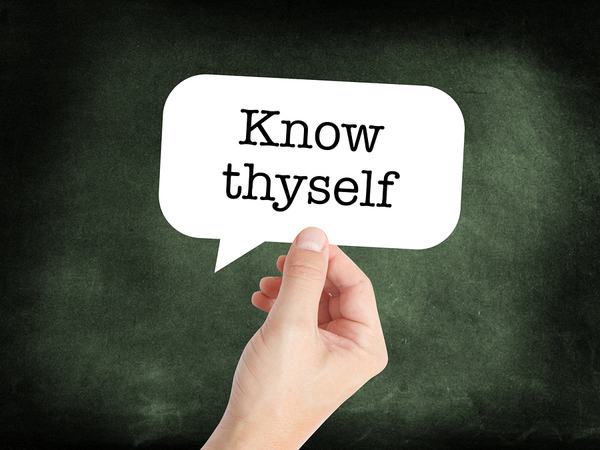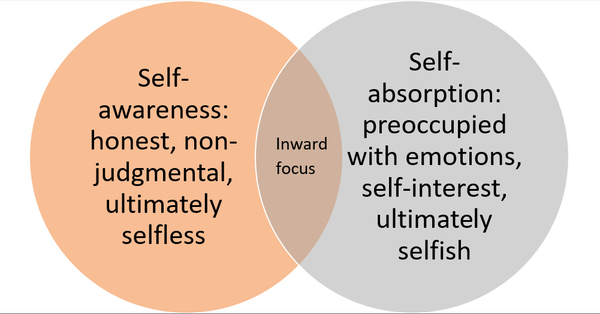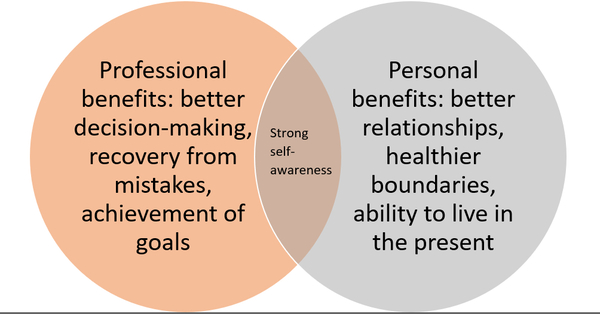THE WORLD’S #1 EXECUTIVE COACHING AND BUSINESS COACHING BLOG SINCE 2017.
Why Executive Coaching Must Emphasize Self-Awareness
May 28, 2019 | Category: Blog, Executive Coaching | Last updated on: January 10, 2025
The saying “Know thyself” has been prominent across multiple civilizations for as long as history has been recorded. Inscribed on temple entrances in ancient Egypt, and known as the most popular Delphic maxim, this fundamental concept is still being espoused well into the twenty-first century.
Self-knowledge is the beginning of self-awareness and all its potential.
Being effective as a human citizen of the world requires self-knowledge. With good self-knowledge, we are able to work with our strengths and find the best ways to overcome our weaknesses. When we know where we tend to fall short, we can use our strengths to work out ways to compensate.
Lack of self-knowledge leads to poor communication, misunderstandings, and time wasted as we stumble around trying different things without regard to whether we’re likely to make them work. Professionally, few people have the luxury of unlimited trial and error, especially when it comes to leading others. It’s one thing to try something new, but quite another to grasp at leadership tactics when the time and talents of other people are at stake.
This is not to say that trying new things is bad. In fact, we should all step out of our comfort zones on occasion. Few things are as satisfying to a mature adult as discovering previously unknown aptitudes! But as we grow as professionals and leaders, understanding our strengths and weaknesses is both invaluable and mandatory. The concept of self-awareness is about knowing oneself and making the most of that knowledge. It is perhaps the most fundamental leadership skill.
What Is Self-Awareness?
Self-awareness begins with self-knowledge. It is taking our self-knowledge and using it to monitor our thoughts, emotions, and beliefs. The self is what makes each of us unique, with our own exclusive collection of experiences, beliefs, and abilities. Self-awareness allows us to evaluate ourselves with a degree of objectivity, and it is a primary driver of self-control.
Self-awareness is closely related to the concept of emotional intelligence, and emotional intelligence can only develop in a context of honest self-awareness. The two main components of self-awareness are the things we notice about ourselves and the way we monitor our inner world. It isn’t necessarily about judging ourselves but more about honestly assessing ourselves in a non-judgmental way. Self-awareness is open-hearted and willing to learn.
The human brain is highly adept at storing information about how we react to certain stimuli, triggers, and situations so we’re ready when they reoccur. While the self-conditioning that naturally occurs due to prior experience is valuable, it is even more valuable when we become aware of it and learn to recognize our preconceptions. This is precisely what allows us to step out of our comfort zone and grow.
When we develop our self-awareness, we’re able to come to peace with who we are and manage our thoughts, behaviors, and emotions proactively rather than reactively. In other words, we are able to act consciously and increase our depth of life experiences.
The Difference Between Being Self-Aware and Self-Absorbed
Self-awareness isn’t the same thing as self-absorption. Being preoccupied with oneself is a sure path to egotistical behavior and selfishness. Self-absorption isn’t so much about knowing oneself as it is about being preoccupied with oneself or one’s own situation to the exclusion of other people or the outside world.
A person who is self-absorbed doesn’t show much concern or appreciation about anyone or anything outside their self-interest. They tend not to make the effort to understand other people’s points of view or their feelings. Self-absorption works strongly against the qualities of empathy and compassion – two qualities that are essential for effective leadership. Self-absorption, in fact, is almost the polar opposite of altruism.
Self-awareness looks inward, but it does so as a way of learning to relate to the world better. Self-absorption looks inward only to ensure that one’s own needs are met with little to no regard to the needs of others. Self-awareness recognizes traits that hold us back and looks for ways to compensate or work around them. Self-absorption is too busy focusing on the self to honestly assess ways that certain character traits may be maladaptive or hold us back.
Self-awareness is ultimately a selfless endeavor, while self-absorption is selfish.
When psychologists help people dig deeper into self-absorption, they often find that self-absorbed people are actually afraid of feeling powerless, out of control, or unworthy. Self-absorption is often an effective cover for feelings of vulnerability and insecurity. By contrast, self-awareness recognizes feelings of inadequacy or vulnerability and strives to address them rather than hide them.
How Can You Increase Your Self-Awareness?
One of the best ways to increase self-awareness, perhaps ironically, is learning how to really listen to other people. Hearing what someone says isn’t the same as listening to what someone says. When you learn to listen, you learn to tune into others’ emotions, body language, and choice of words. Learning to do this without constant judgment increases empathy and can help you learn to listen to your own inner voice – without judgment or evaluation.
Another outer-focused practice that’s good for increasing self-awareness is gaining new perspectives. It can be eye-opening to realize that other people don’t view situations the same way we do! Learning to appreciate other people’s viewpoints is a great first step in learning to ask for and listen to honest feedback.
Any executive coach will tell you that gathering 360-degree feedback on a client is tremendously valuable to the coaching process. And when individuals learn to recognize their blind spots and accept feedback, they are rewarded with a fuller picture of themselves and greater self-awareness.
Some people find that maintaining a journal is an excellent way to increase self-awareness. Letting thoughts flow onto paper and then reviewing them later can give us great insight into how certain situations trigger certain thoughts and behaviors.
Most people find that carving out “down time” every day is essential to developing better self-awareness. It’s not always easy being alone with our thoughts without our phones or computers to distract us, but it’s a great way to connect with ourselves.
What Habits Help You Maintain Good Self-Awareness?
The human brain shows remarkable plasticity, well into adulthood. Scientists used to think that changes in the brain only happened during childhood and that by early adulthood, the brain’s makeup was fixed. But more modern research has shown that the brain continues to alter existing neural pathways and create new ones, helping us adapt to new experiences, learn new things, and create new memories.
In the late twentieth century, researchers began to study cases where people who suffered massive strokes were able to regain function – major confirmation of the brain’s continuing ability to change. Typical adults with healthy brains can, in fact, create new neural connections, reorganize neurological pathways, and even create new neurons.
But adult brains often operate on autopilot. This can be tremendously important for activities that require hard-wired “muscle memory” like driving a car, typing, or performing brain surgery. The brain operates in this way to conserve energy, but that doesn’t mean you can’t change even deeply entrenched habits. You can, but it requires consistent long-term practice.
Your brain creates new connections based on what you do repeatedly, and that’s one of the reasons it can be so hard to break out of a bad habit or create a new habit. Commitment is the key. The skills you use for building self-awareness must be practiced consistently over the long term so that new thinking patterns and new habits become ingrained. It’s easier said than done, but you can actually use mobile apps to help you strengthen new habits if traditional methods like calendars and reminders aren’t enough.
How Does Self-Awareness Make Leaders More Effective?
Self-aware leaders are better than non-self-aware leaders in virtually every way.
Twenty years ago, two Cornell University psychology professors named Dunning and Kruger published a paper titled, “Unskilled and unaware of it: how difficulties in recognizing one’s own incompetence lead to inflated self-assessments.” You’ve undoubtedly heard of the so-called Dunning-Kruger effect, where people think they are more competent than they actually are. Ignorance of oneself and one’s limitations paradoxically often increases confidence – sometimes with disastrous results.
Without strong self-awareness, we’re quick to fool ourselves into thinking we know what we’re doing when we don’t. In a leader, this can cause projects to fail, people to quit, and revenues to fall. Self-awareness keeps us apprised of our strengths and our weaknesses and knowing both is essential to leading effectively.
The self-aware leader is in tune not only with their own inner world, thoughts, emotions, strengths, and weaknesses but also has better situational awareness (due to stronger empathy). Self-awareness strengthens the individual leader’s performance while helping them elicit the best performance from everyone on the team. Self-awareness, trust, and wisdom go together, and in a leader, those qualities lead to teams that are loyal and hard-working.
Because the self-aware leader is aware of their own limitations, they’re far more likely to continue to strive for improvement. They’re more likely to ask for feedback and to genuinely listen to team members and trust them to contribute to project, team, and organizational success. Furthermore, teams led by self-aware leaders are less likely to be plagued by internal team conflict. In other words, a leader’s self-awareness helps promote self-awareness and its benefits in others.
How Can Non-Self-Aware Leaders Fall Short?
Most of us have encountered leaders who think they excel at a given skill when they don’t. Or leaders who think they’re great to work for, despite driving off the best people on the team. Just about everyone has worked with people who, despite sterling qualifications lack insight on how they are perceived by others. People who lack self-awareness are more than just frustrating: they can severely undermine team success.
While not all workplace conflict is due to lack of self-awareness, much of it is, and it may be based on ill-informed training or not having been led with self-awareness. The good news is that in many cases, people who lack self-awareness may actually want to be effective, but they don’t realize that they’re not.
There’s no question that personality shapes leadership style, which in turns shapes leadership culture, which strongly influences organizational culture. Negative behavioral traits in leaders are often based on ingrained personality traits that may have gone unexamined for a lifetime. A leader who gets results (perhaps through intimidation or other questionable tactics) despite lack of self-awareness rarely is able to sustain success.
Team members – particularly team members with outstanding potential – don’t stick with leaders who employ techniques that are uninformed by self-awareness. Seeing a toxic culture in the making, they’re often the first to leave.
This is not to say that leadership has to be touchy-feely, or that no one should ever have their feelings hurt. It simply means that self-awareness helps leaders develop the leadership skills that get lasting results and that build a strong team and corporate culture, which are necessary for lasting success.
What Are the Personal and Professional Benefits of Self-Awareness?
Developing self-awareness benefits both personal and professional life.
In an ideal world, everyone would experience the benefits of heightened self-awareness. These benefits make both professional and personal life better. When you take the time to develop self-awareness, you can expect the following benefits:
- Better decision-making and priority setting, based on better self-understanding
- The joy of taking an active role in life rather than just reacting to things that happen
- Less tendency to take things too personally – a major time and energy waster!
- Ability to see missteps and mistakes as opportunities for positive change
- Understanding of why you do what you do
- Stronger personal and professional relationships
- A better foundation on which to set goals and build dreams
- Better ability to forgive and let go of past wrongdoings
- Healthier personal boundaries
- Stronger ability to live in the present moment rather than dwelling on the past or future
Whether or not you pursue top leadership positions, self-awareness serves you well. And if you do achieve positions of leadership, it will help you lead more effectively. In fact, self-awareness is so essential to strong leadership that executive coaches regularly work with clients on improving their self-awareness.
Conclusion
Executive coaching today usually focuses on working with high-potential leaders and helping them fulfill their great potential. The ability to lead is based on much more than industry expertise, job experience, or a specific set of skills. Executive coaching is about recognizing strengths, understanding where there is opportunity for improvement, setting goals, and regularly working on the skills that lead to overall excellence.
As an executive coach, I regularly work with clients on skills like communication, delegation, and conflict resolution. All of these skills benefit from a foundation of strong self-awareness. The self-aware person doesn’t assume that people can read their mind, or that team members will naturally know which tasks to tackle. Self-aware leaders can also recognize conflict earlier on and understand that conflicts tend not to go away by themselves but must be addressed with tact and fairness.
In fact, if I could only work on one skill with the leaders I coach, it would be self-awareness, because so many essential leadership skills depend on it. Great athletic coaches want to work with players who have a strong foundation of athleticism because it makes it so much easier to teach them specific game skills. Likewise, executive coaches get the best results when they work with clients who have a strong foundation of self-awareness, because self-awareness powers so many positive thought patterns and actions.
As an executive coach, I can attest to the value of self-awareness in leadership.
If you are interested in delving deeper into how self-awareness powers effective leadership, I encourage you to check out my books, especially Intelligent Leadership: What You Need to Know to Unlock Your Full Potential. Just as you can’t slap a coat of paint onto an unsound structure and make a home, neither can you turn the person who lacks self-awareness into a great leader by teaching them specific techniques. The most important leadership qualifications come from within, and self-awareness is the key to unlocking those qualifications.
Glossary of Terms
Brain plasticity – the remarkable ability of the human brain to modify its own structure and function based on changes to the external environment, such as the learning of new skills or consistent practice of habits. Though scientists used to think plasticity was all but gone by adulthood, modern researchers have shown that the adult brain has an extraordinary capacity for change improvement.
Cognitive bias – mistakes in reasoning, evaluating, and other cognitive processes that are often the result of clinging to preferences or beliefs despite contradictory information
Corporate culture – the collection of beliefs, behaviors, and attitudes that shape how a company’s employees interact with each other and with management, and how they handle transactions with outsiders.
Dunning-Kruger effect – a type of cognitive bias that causes people to mistakenly think that their abilities are greater than they actually are. Self-awareness is the key to avoiding this type of cognitive bias.
Emotional intelligence – a person’s ability to be self-aware and to understand, regulate, and express emotions so as to handle personal and professional relationships with empathy, fairness, and judiciousness
Self-absorption – a person’s excessive preoccupation with their own interests, emotions, and needs at the expense of those of others
Self-awareness – a person’s clear understanding of their own personality, including their strengths, weaknesses, motivations, emotions, beliefs, and thought patterns. Good self-awareness allows for greater understanding of others and of situations, and a better ability to initiate and respond to situations.







